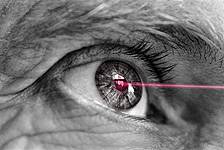Femtosecond laser-assisted cataract surgery (FLACS) is the latest advance in cataract surgery.
Performed without the use of traditional blades or scalpels, this new generation of cataract surgery employs a particular sort of laser to accurately create incisions and break apart the cataract.
The femtosecond laser is set to make a precise incision and break up the cataract, allowing faster and more accurate cataract surgery.
The procedure
Using state-of-the-art, ultra-precise laser technology, a femtosecond laser is used to create a tiny hole and then break up the cataract, reducing the surgical time and recovery.
Cataracts are a clouding of the eye’s natural lens, requiring surgical removal and replacement with a new Intraocular Lens (IOL).
Step 1: Corneal incision
An incision is created in the cornea, just like in traditional cataract surgery. However, in femtosecond laser cataract surgery, the cut is made with a specific laser rather than a surgical knife. The process is very precise since the laser is programmed for the exact depth and size of the incision.
Step 2: Capsulotomy
The laser then creates an opening in the capsule bag that surrounds the lens, known as a capsulotomy, giving the surgeon access to the clouded lens, the cataract.
In manual cataract surgery this is usually done using a needle, but in femtosecond laser cataract surgery a laser is utilized for a more precise result.
Step 3: Breaking up the cataract
Finally, the cataract is fractured with a femtosecond laser rather than an old-fashioned ultrasonic device, with the surgeon performing the final removal.
SEE RELATED: Cataract Surgery Complications
Schedule an appointment with an eye doctor near you to find out whether you can benefit from FLACS.
Benefits of femtosecond laser cataract surgery
The femtosecond laser cataract surgery process has brought a new degree of precision to cataract surgery. Some of the advantages of this procedure over regular cataract surgery include:
1. Precision and safety
Femtosecond laser surgery allows surgeons to design their incisions down to the micron level, substantially enhancing accuracy and lowering the risk of error.
2. Needle and blade free
During cataract surgery, laser cataract surgery reduces the need for several surgical instruments and eliminates the use of blades.
3. IOL stability
The replacement lens (IOL) is more stable after laser surgery, due to the precision of the laser in making the hole in the capsule bag.
4. Faster surgery
The use of a femtosecond laser reduces the amount of ultrasonic energy necessary to remove the cataractous lens.
5. Faster recovery time
When a laser is used for increased precision, the cut in the cornea is more likely to self-seal after the procedure. Healing and recovery times can be faster.
6. Optimized visual results
Premium intraocular lenses are now incredibly effective when inserted during surgery. The optical benefits of these newer lenses can be fully realized with femtosecond laser cataract surgery.
LEARN MORE: Guide to Cataracts
Contact an eye doctor near you to find out more about femtosecond laser cataract surgery.
While femtosecond technology is still in its early stages of development, it may generally provide safer, faster, and precise outcomes for cataract surgery.

